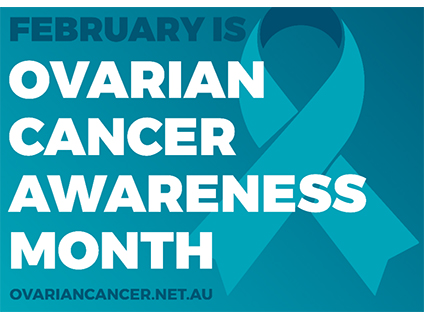Ovarian Cancer Awareness Month
01/02/2019

Being aware of the signs of ovarian cancer could save your life.
February marks Ovarian Cancer Awareness Month and with that comes the reminder to all women, no matter their age, to get a check-up if they feel something isn’t right. It is also a reminder to those women battling ovarian cancer that they aren’t alone.
Ovarian cancer is difficult to detect as its symptoms are vague and often mistaken for other illnesses.
More than 1000 women will die from ovarian cancer this year alone but that number could be reduced if women knew what to look out for.
Cabrini’s Director of Szalmuk Family Department of Medical Oncology, Professor Gary Richardson, said Ovarian Cancer Awareness Month was a chance for people to “spread the word”.
“Women are pretty good at knowing their body, but if they think there are changes that are going on, then they need to see their GP,” Prof Richardson said.
“If they’ve been to a GP with symptoms that don’t go away within a couple of weeks, then they should look at having some further investigation. They need to pursue it.”
Prof Richardson said symptoms included bloating, feeling off in the stomach, nausea, minor disturbances in bowel movements or bladder problems and often no severe pain.
“The difficulty is diagnosing it and diagnosing it early,” he said.
“Often you don’t get symptoms or the symptoms are very vague. There is no screening test currently for it – nothing like a mammogram or a colonoscopy.”
Prof Richardson said there would be more than 1600 cases of ovarian cancer diagnosed in Australia this year and more than 1000 Australian women would die from the disease.
He said Ovarian Cancer Awareness Month was a chance for Cabrini to support the Ovarian Cancer Research Foundation and to spread the word from patients back into the community.
“I think it’s important that people have general awareness about ovarian cancer and that we are able to support those women who are affected,” Prof Richardson said.
He added that women with a family history of breast or ovarian cancer should talk to their doctor about being genetically tested, but other than maintaining a healthy weight and regular exercise, there was not a lot women could do to prevent ovarian cancer.
On February 28 we recognise Teal Ribbon Day, a day to raise awareness of ovarian cancer, show support for women living with ovarian cancer, and their families, and remember those who have died from the disease.
As head of Cabrini’s Department of Medical Oncology, Prof Richardson said one of his roles was to run clinical research, including overseeing clinical trials, and at present Cabrini’s oncology department had 70 active clinical trials.
“Our advances in medical technology also have the potential to make an enormous impact on the lives of people with ovarian cancer. There is technology being developed that is able to detect small amounts of tumour DNA in the bloodstream, which may become an early test for ovarian cancer in the future.”